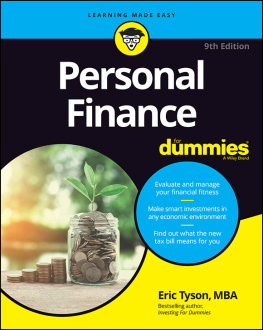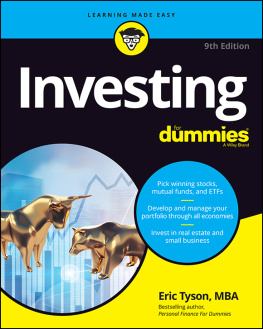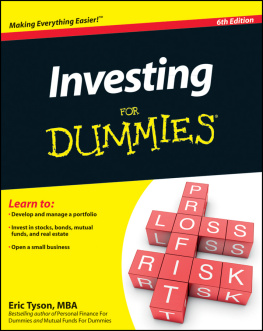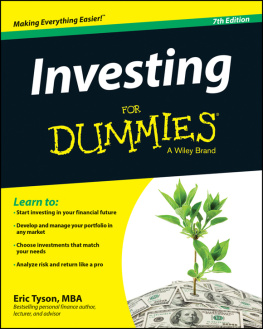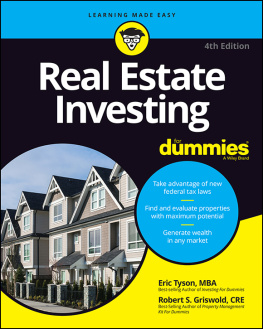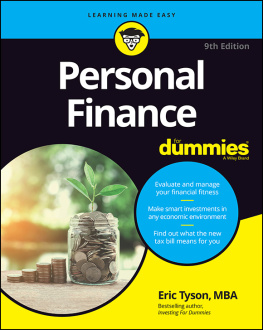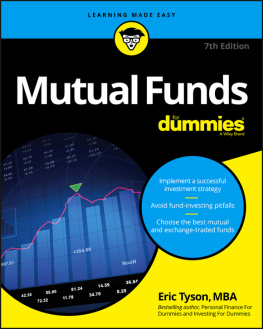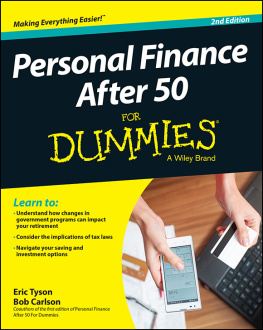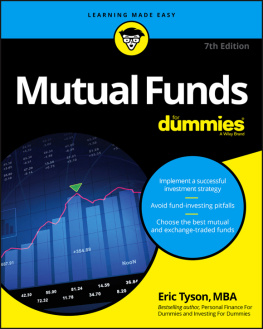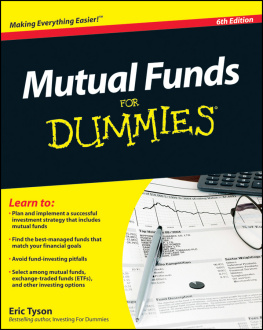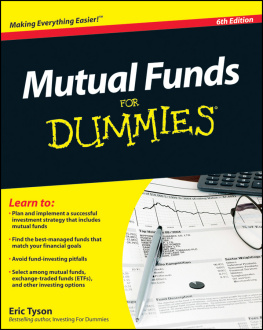
Eric Tysons Keys to Personal Financial Success
- Take charge of your finances. Procrastinating is detrimental to your long-term financial health. Dont wait for a crisis or major life event to get your act together. Read this book and start implementing a plan now!
- Dont buy consumer items (cars, clothing, vacations, and so on) that lose value over time on credit. Use debt only to make investments in things that gain value, such as real estate, a business, or an education.
- Use credit cards only for convenience, not for carrying debt. If you tend to run up credit-card debt, then get rid of your cards and use only cash, checks, and debit cards.
- Live within your means and dont try to keep up with your co-workers, neighbors, and peers. Many who engage in conspicuous consumption are borrowing against their future; some end up bankrupt.
- Save and invest at least 5 to 10 percent of your income. Preferably, invest through a retirement savings account to reduce your taxes and ensure your future financial independence.
- Understand and use your employee benefits. If youre self-employed, find the best investment and insurance options available to you and use them.
- Research before you buy. Never purchase a financial product or service on the basis of an advertisement or salespersons solicitation.
- Avoid financial products that carry high commissions and expenses. Companies that sell their products through aggressive sales techniques generally have the worst financial products and the highest fees and commissions.
- Dont purchase any financial product that you dont understand. Ask questions and compare what youre being offered to what you can get from the best sources, which I recommend in this book.
- Invest the majority of your long-term money in ownership vehicles that have appreciation potential, such as stocks, real estate, and your own business. When you invest in bonds or bank accounts, youre simply lending your money to others, and the return you earn probably wont keep you ahead of inflation and taxes.
- Avoid making emotionally based financial decisions. For example, investors who panic and sell their stock holdings after a major market correction miss a buying opportunity. Be especially careful in making important financial decisions after a major life change, such as a divorce, job loss, or death in your family.
- Make investing decisions based upon your needs and the long-term fundamentals of what youre buying. Ignore the predictive advice offered by financial prognosticators nobody has a working crystal ball. Dont make knee-jerk decisions based on news headlines.
- Own your home. In the long run, owning is more cost-effective than renting, unless you have a terrific rent-control deal. But dont buy until you can stay put for a number of years.
- Purchase broad insurance coverage to protect against financial catastrophes. Eliminate insurance for small potential losses.
- If youre married, make time to discuss joint goals, issues, and concerns. Be accepting of your partners money personality; learn to compromise and manage as a team.
- Prepare for life changes. The better you are at living within your means and anticipating life changes, the better off you will be financially and emotionally.
- Read publications that have high quality standards and that arent afraid to take a stand and recommend whats in your best interests. Avoid those that base their content on the hottest financial headlines or the whims of advertisers.
- Prioritize your financial goals and start working toward them. Be patient. Focus on your accomplishments and learn from your mistakes.
- Hire yourself first. You are the best financial person that you can hire. If you need help making a major decision, hire conflict-free advisors who charge a fee for their time. Work in partnership with advisors dont abdicate control.
- Invest in yourself and others. Invest in your education, your health, and your relationships with family and friends. Having a lot of money isnt worth much if you dont have your health and people with whom to share your life. Give your time and money to causes that better our society and world.
Praise for Eric Tyson
Eric Tyson is doing something important namely, helping people at all income levels to take control of their financial futures. This book is a natural outgrowth of Tysons vision that he has nurtured for years. Like Henry Ford, he wants to make something that was previously accessible only to the wealthy accessible to middle-income Americans.
James C. Collins, coauthor of the national bestsellers Built to Last and Good to Great
Personal Finance For Dummies is the perfect book for people who feel guilty about inadequately managing their money but are intimidated by all of the publications out there. Its a painless way to learn how to take control.
Karen Tofte, producer, National Public Radios Sound Money
Eric Tyson seems the perfect writer for a For Dummies book. He doesnt tell you what to do or consider doing without explaining the whys and hows and the booby traps to avoid in plain English . It will lead you through the thickets of your own finances as painlessly as I can imagine.
Chicago Tribune
This book provides easy-to-understand personal financial information and advice for those without great wealth or knowledge in this area. Practitioners like Eric Tyson, who care about the well-being of middle-income people, are rare in todays society.
Joel Hyatt, founder of Hyatt Legal Services, one of the nations largest general-practice personal legal service firms
Worth getting. Scores of all-purpose money-management books reach bookstores every year, but only once every couple of years does a standout personal finance primer come along. Personal Finance For Dummies, by financial counselor and columnist Eric Tyson, provides detailed, action-oriented advice on everyday financial questions . Tysons style is readable and unintimidating.
Kristin Davis, Kiplingers Personal Finance magazine
This is a great book. Its understandable. Other financial books are too technical and this one really is different.
Business Radio Network
More Bestselling For Dummies Titles by Eric Tyson
Investing For Dummies
A Wall Street Journal bestseller, this book walks you through how to build wealth in stocks, real estate, and small business as well as other investments. Also check out the recently released Investing in Your 20s and 30s For Dummies.
Mutual Funds For Dummies
This best-selling guide is now updated to include current fund and portfolio recommendations. Using the practical tips and techniques, youll design a mutual fund investment plan suited to your income, lifestyle, and risk preferences.
Personal Finance in Your 20s For Dummies
This hands-on, friendly guide provides you with the targeted financial advice you need to establish firm financial footing in your 20s and to secure your finances for years to come. When it comes to protecting your financial future, starting sooner rather than later is the smartest thing you can do.
Home Buying For Dummies
Americas #1 real-estate book includes coverage of online resources in addition to sound financial advice from Eric Tyson and frontline real-estate insights from industry veteran Ray Brown. Also available from Americas best-selling real-estate team of Tyson and Brown
Next page
